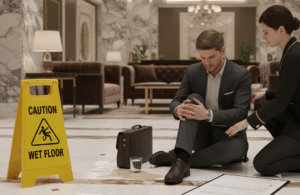Hotel slip and fall settlements can be life changing. In actuality, they frequently rely on the severity of the damage, the amount of supporting documentation, and the hotel’s willingness to pay rather than fight.
The compensation for those who trip over uneven rugs, slip on damp floors, or are injured in a lobby can range from a little amount to cover medical expenses to a significant settlement that covers lost wages, prolonged recuperation, and chronic discomfort. The term “hotel slip and fall settlements” is appropriate because these incidents are frequent and real, and hotels are insured for this very reason.
Comfort, large beds, and possibly a pool come to mind when you think of a hotel. You don’t consider falling on a loose stair in the hallway or slipping on a slippery tile next to the breakfast area. The accidents that result in hotel slip and fall settlements, however, are those ones. When a visitor arrives expecting a peaceful vacation, they are met by attorneys, insurance adjusters, and doctors.
Hotels are required by law to maintain the security of their premises. This entails thorough cleaning, prompt hazard repair, and alerting visitors about potential danger. Injuries ensue when they don’t. Furthermore, hotel injuries go beyond simple scrapes. Broken bones, back issues, brain injuries, or long-term mobility problems can result from a fall. For this reason, there are hotel slip and fall settlements. The cost of getting back on your feet is what they want to pay for.
How Hotel Slip and Fall Settlements Works
The procedure starts practically immediately after someone is injured. An incident report is written by a hotel manager. Insurance is informed. Physicians record the injuries. A lawyer is hired by the damaged party to advocate for a just resolution. The case for hotel slip and fall settlements is strengthened by all of this.
Evidence determines the case’s strength. It helps if there are pictures of the wet floor or if someone witnessed the trip. Medical records are also important. They clearly display the extent of the fall’s destruction. Insurance companies assess the risk of going to court after reviewing this mountain of evidence. They frequently determine that a settlement is more sensible than a trial.
The number of settlements varies. Some may simply pay for therapy sessions and hospital fees. Some include lost income in the event that the visitor is unable to work. The biggest ones include discomfort, chronic suffering, or irreversible disability. This explains why hotel slip and fall settlements vary so much.
The goal of hotels is to maintain their good name. The last thing they want is a protracted legal battle that makes headlines about dangerous establishments. The purpose of insurance coverage is to shield people from those dangers. It may be less expensive, quicker, and quieter to settle.
See also: Gas Station Slip and Fall Settlements
A colony stays away from the unknown as well. If the hotel has a poor case, a jury may give a significantly higher amount. Paying in advance allows the hotel to maintain control. The majority of hotel slip and fall settlements are caused by this risk balance.
The largest difference is the severity of the injury. A fractured hip is not the same as a bruised knee. Recovery time is also important. A person would typically receive a larger compensation if they must spend months in physical rehabilitation or are unable to return to work.
Another factor is evidence. Strong evidence that the hotel neglected to warn, clean, or repair will increase the numbers. It is more difficult to win with weak proof.
Lastly, legal counsel is important. A competent attorney is able to appraise the claim, collect the appropriate paperwork, and engage in firm negotiations. Hotel slip and fall settlements are frequently substantially lower for those who attempt to manage claims on their own.
In hotels, slip and fall incidents occur from quite commonplace circumstances. damp bathroom floors that aren’t properly matted. Unattended food spills close to the breakfast area. decking for swimming pools that lack traction. worn carpets that snag shoes in hallways. stairs without railings that are secure. Parking lots and hallways are poorly lit.
Until you consider the harm that a single mishap may inflict, all of these risks seem insignificant. A hotel ought to respond to them promptly. Hotel slip and fall settlements become the route to justice in the event that they fail.
For just these occasions, hotels have liability insurance. The insurance often receives the claim when a visitor is hurt. The compensation could not even be handled directly by the hotel. After conducting research and reviewing the documentation, insurance adjusters determine the amount they are prepared to offer.
This indicates that settlements are more about the business of risk and reward than they are about the hotel manager’s sentiments. The goal of insurance companies is cost reduction. The goal of injured people’s attorneys is to obtain adequate compensation. Hotel slide and fall settlements fall in the middle of the two objectives.
In a few months, some instances are resolved. The insurance might make a speedy payment if there is clear liability and the injury is well-documented. Some instances take a year or longer to resolve, particularly when there are severe injuries and continuous recuperation. Lawyers occasionally hold off on reaching a settlement until doctors are fully informed. If you accept too quickly, you can lose out on future medical expenses.
Another factor that makes legal assistance crucial is that timing. A lawyer is aware of when waiting will provide a better outcome and when a settlement offer is reasonable. Guests who quickly settle in order to get it over with frequently come to regret it.
Lives are altered by injuries. They can force someone to suffer with discomfort, miss weeks of work, or give up once-enjoyed activities. Medical bills mount up. Future care may be required. A just settlement takes into account both the past and the future.
Hotels are insured and have resources. Typically, guests don’t. Settlements are in place to equalize that disparity. Because the hotel didn’t keep the floor safe, someone who was only trying to enjoy their stay shouldn’t be saddled with crippling debt.
Some people believe that settlements are solely for financial gain. In actuality, though, they symbolize closure. They allow the injured individual to focus on their recuperation, manage lost income, and pay for treatment. In the absence of such, stress persists long after the fall.
Settlements act as a reminder to hotels to maintain excellent standards. A single lawsuit may serve as a signal to increase security. This knock-on impact reduces the likelihood of accidents in the future. Therefore, hotel slip and fall settlements serve purposes beyond simply covering expenses. They encourage hotels to improve.
The most important lesson is that mishaps can occur in unexpected areas. Before someone slips on newly swept marble without any warning signs, a hotel lobby appears innocuous. Before a loose railing gives way, a staircase appears to be in good condition.
People feel more confident to act if they are wounded when they understand how settlements operate. Keep a record of everything. Seek medical help. Consult a lawyer. The result is shaped by these steps. Hotel slip and fall settlements might at least lessen the financial burden of an accident, even though not every claim results in a sizable reward.
That being said, a hotel should ultimately be secure. There is a way forward if it isn’t and a visitor gets hurt. Evidence, negotiation, and settlement are the steps in that process.
The pain of an injury cannot be relieved by hotel slip and fall settlements. However, they can provide some feeling of justice and pay for the mounting expenses. They are in place because hotels need to be held responsible and visitors should be protected.


